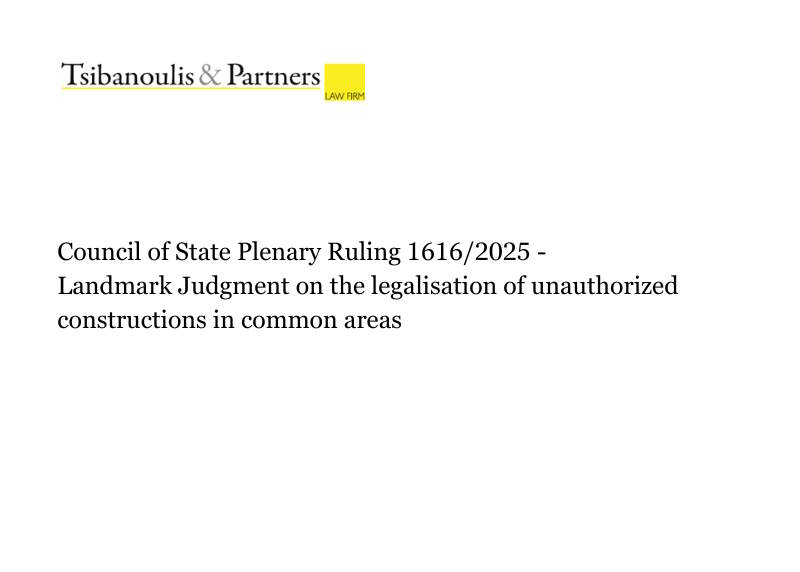NEWS

Council of State Plenary Decision No. 1616/2025 – Landmark ruling on the legalisation of unauthorised constructions in common areas: objections by co-owners serve as a barrier, with absolute priority given to the protection of ownership rights
According to the summary of the decision published by the Council of State on 22/9/2025, the Plenary of the Council of State (Greece’s Supreme Administrative Court), in its landmark ruling No. 1616/2025, held by majority that in the absence of a condominium regulation, the provision of Article 11(1)(d) of Law 4178/2013 – which allowed for the legalisation of unauthorised constructions in shared/common areas on the basis of majority voting – does not apply if even a single co-owner objects.
The Court held that while the provision in question serves a facilitating purpose (namely, the recording and addressing of unauthorised constructions), it cannot override the constitutionally protected right to property, as enshrined in Articles 17 and 24 of the Greek Constitution.
The case was successfully handled by Aristeidis Goulandris, Head of the Real Estate Practice at Tsibanoulis & Partners Law Firm, together with Spyridon Vlachopoulos, Professor of Public Law.
Key takeaways arising from this summary of the decision published include:
- No legalisation of unauthorised structures in shared or common areas may take place without unanimous consent when there is no existing condominium regulation and co-owner objections have been submitted.
- Urban Planning Authorities (ΥΔΟΜ) and Councils for Architecture and Planning Issues (SY.PO.TH.A.) are obliged to reject or revoke applications relying solely on majority approval where even one co-owner has expressed dissent.
- The civil courts have the authority to make the final determination regarding the rights of co-owners in the common areas.
This decision (as published in summary) institutionally strengthens the protection of co-ownership rights against unilateral or majority actions that alter shared property. Α co-owner – even one who holds the majority of shares in the co-ownership – cannot, at will, occupy common areas, legalise such occupation, and subsequently integrate those areas into their exclusive property (through amendment of the establishment act), in disregard of the stated objections of other co-owners. In other words, urban planning "legalisation" cannot be used – particularly with the assistance of public authorities – to effectively nullify the private real property rights of co-owners over common areas.
By holding that the provision in question cannot be applied in cases where even one co-owner objects, the Plenary of the Council of State essentially interpreted Article 11(1)(d) of Law 4178/2013 (which provided for the possibility of legalisation of unauthorised constructions in common areas by majority decision) in a manner consistent with Articles 17 and 24 of the Constitution. Thus, the Court construed the provision in conformity with constitutional protections and with the broader framework of property law, effectively adding as a substantive condition for its application that the constitutionally protected rights of other co-owners over the common areas must not be infringed. In this way, the Court did not declare the provision of Law 4178/2013 unconstitutional (the constitutionality of which had already been confirmed by Plenary Decision 1858/2015), nor, by extension, did it raise an issue of unconstitutionality in respect of the corresponding provisions of the current legislation on the legalisation of unauthorised constructions (Law 4495/2017). In any event, it clarified the manner in which those provisions must be interpreted.
In view of the above, it is considered that the reasoning of the decision, which interprets Article 11(1)(d) of Law 4178/2013, also applies mutatis mutandis to Article 98 of Law 4495/2017 – i.e., to the current legalisation framework regarding unauthorized construction in common areas. Consequently, the existing provision of Law 4495/2017 can only be construed in the same manner: namely, in the absence of a condominium regulation, the legalisation of unauthorised constructions in common areas may be effected only if not even a single co-owner objects.
In practical terms, going forward:
- Any co-owner wishing to legalise unauthorised structures in common areas must first obtain the explicit consent of all other co-owners.
- Conversely, a co-owner wishing to oppose such legalisation should clearly submit their objection to the competent Urban Planning Authority (ΥΔΟΜ).
This Plenary decision underscores the need for balance between the legislator’s aim to regularise unauthorised buildings and maintain accurate planning records, and the fundamental requirement to safeguard the real property rights of co-owners over shared spaces. The Court clearly affirms that the protection of co-ownership rights cannot be overridden by facilitating administrative procedures.
See the Greek version here.
For further information, please contact Aristeidis Goulandris, Head of the Real Estate & Construction team at Tsibanoulis & Partners Law Firm.



